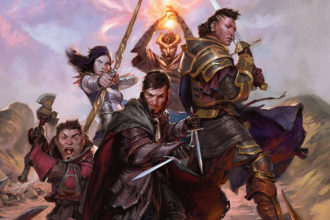New 5e Feats – Advanced Healer, Martial Arts Training, Survivalist

One of my favorite parts about 5th edition is the incorporation of soft-multiclassing feats which allow players to create a variety of themes without watering down their core class. One of my least favorite things is how Medicine is a throw-away skill not worthy of the slot. These feats originally appeared on www.gameschangelives.com and are presented here with significant playtest edits.
Advanced Healer
The Healer feat includes some basic skills I feel should be included as a part of every healer’s kit. As a house rule, any individual can use a healer’s kit to stabilize a companion. If you have proficiency in the Medicine skill, you gain the following benefits when using a Healing kit.
- When you use a healing kit to stabilize an ally, that ally also regains 1 hit point.
- As an action, you may use a healing kit to quickly bind wounds, offer pain-numbing salves, and apply natural anticoagulants. The target heals 1d6+4 hit points of damage. The target also gain a number of temporary hit points equal to its number of hit dice. The target loses any remaining temporary hit points at the end of its next short rest.
When using this house rule, the Advanced Healer feat replaces the standard Healer feat. This variant works well in campaign settings without easy access to magical healing, such as Dark Sun, or ones interested in giving the currently useless Medicine skill some life.
If you do not wish to use this house rule, you may include the current Healer feat as a prerequisite to the Advanced Healer feat.
Prerequisite: Proficiency with Medicine checks (and/or the Healer feat, see above)
You are a skilled herbalist, healer, and surgeon and gain the following benefits:
- Proficiency with Herbalism kits.
- Whenever you use an action and spend a use of a healer’s kit on a target, the target may spend 1 hit dice. If they do, the target heals damage as if they’d spent the hit dice at the end of a short rest. This healing is in addition to the benefits normally gained by the use of a healer’s kit.
- Whenever you spend a use of a healer’s kit to stabilize a dying creature, that creature regains a number of hit points equal to either your Intelligence or Wisdom modifier (your choice).
- Once per day after a short or long rest, you may expend a use of a healer’s kit to grant a creature a bonus saving throw against one disease or one condition currently affecting it at the end of that short rest. The condition can be blinded, deafened, paralyzed, or poisoned. The saving throw gains a bonus equal to your Intelligence or Wisdom modifier (your choice). The DC of the saving throw equals the DC of the spell or effect that initiated the disease or condition. If used during a long rest, you may grant this bonus save to a number of creatures equal to either your Intelligence or Wisdom modifier (your choice). Each creature treated during a long rest requires one use of a healer’s kit.
Martial Arts Training
This feat is designed for melee-combatants who are trained in weaponless techniques such as brawling barbarians, samurai-themed fighters, or ninja-like rogues, as well as spellcasters who believe the mind, body, and spirit work together in balance. Monks may use this feat to replicate a number of different fighting styles that rely on endurance, presence, or insight in place of the standard agility or raw power.
You are trained in one of several weaponless combat techniques and gain the following benefits:
- You have studied the detailed anatomy of your opponents, intimidate them with your unshakable confidence, are able to pinpoint weak spots with a keen eye, or use your high pain tolerance to power through your enemy’s defenses. Choose an ability score. You may use that ability score in place of Strength for the attack and damage rolls of your unarmed strikes.
- Your unarmed damage increases by one die type. For example, from 1 point to 1d4, or 1d10 to 1d12.
Survivalist
There are numerous feats that duplicate certain class features, such as the battlemaster’s combat maneuvers, ritual casting, and even spellcasting. This feat is designed for wilderness savvy non-ranger characters such as those with the Hermit, Outlander, or Soldier backgrounds. Though similar in many aspects to the ranger’s Natural Explorer class feature, survivalists possess neither the tracking skills nor the multitasking abilities of a true ranger, but are always prepared for the worst.
You have spent extensive time in the wild, communing with its inhabitants and confronting its dangers. You are always prepared. Once per day you may build, find, or consider yourself in possession of a single piece of normal equipment worth 3 gp or less and weighing no more than 2 lbs. If you take a short rest to build or find the equipment, these limits are doubled. (your DM has the final say on what is available and may make exceptions to the price or weight limits if certain resources are readily available, such as vines to make a rope). Once per day at the end of a short or long rest you may restock a healing kit with 1 use.
In addition you may choose one type of terrain: arctic, coast, desert, forest, grassland, mountain, swamp, or the Underdark. If your campaign is entirely aquatic, you may instead select from: arctic, coastal, the Deep, open ocean, or tropical. You gain the following benefits:
- When you make an Intelligence or Wisdom check related to your chosen terrain, your proficiency bonus is doubled if you are using a skill that you’re proficient in.
- While traveling for an hour or more in your chosen terrain, difficult terrain does not slow your group’s progress.
- If you are traveling alone for one hour or more in your chosen terrain, you may move stealthily at a normal pace.
- When you forage in your chosen terrain, you find twice as much food as you normally would.
- If you are a ranger, this feature instead grants you an additional favored terrain in addition to the above benefits.



